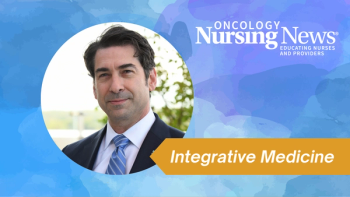
Addressing Psychosocial Issues in AYA Patients
The PRISM intervention improved psychosocial wellbeing in younger patients with cancer.
Targeted intervention is effective in improving psychosocial stress experienced by many adolescent and young adult (AYA) patients with cancer, according to a study released ahead of the 2017 Palliative and Supportive Care in Oncology Symposium to be held Oct. 27-28 in San Diego.
Researchers from Seattle Children's Cancer and Blood Disorders Center, Seattle Children's Hospital and Seattle Children's Research Institute conducted a pilot randomized controlled trial that examined 99 AYA patients between 12 and 25 years old, who were diagnosed with new or newly recurrent disease for at least two weeks.
They used an intervention called Promoting Resilience in Stress Management (PRISM). According to the authors, PRISM uses three sets of resources that can help manage adversity: internal resources, such as stress-management or mindfulness skills; community resources, such as social support; and existential resources, such as spirituality and the search for purpose.
“The experience of cancer is stressful in all realms, but we tend to focus more on physical symptoms than the equally important social and emotional challenges,” said Abby R. Rosenberg, M.D., director of palliative care and resilience research at Seattle Children’s Research Institute and lead author on the study. “This is particularly true for adolescents and young adults who already struggle with normal developmental changes. When you throw cancer into the mix, it can become much harder.”
Patients received either PRISM or usual psychosocial care, which Rosenberg said at her center often includes a social worker as well as additional resources like professional psychology services, if a referral is placed. All patients had access to standard psychosocial supportive care, including access to a social worker, psychologists, child-life specialists and other experts in AYA oncology care, if needed.
PRISM was delivered in four 30- to 60-minute-long one-on-one sessions with a trained research associate, followed by a family meeting that allowed AYA patients to share what was helpful to them. All but four patients who received PRISM participated in the family meeting.
Patients were asked to complete surveys at enrollment, two months, four months and then final outcomes at six months.
The researchers found that the intervention improved resilience and quality of life, increased hope and lowered distress in the majority of patients.
In addition, the incidence of depression was much lower. The rate in the intervention group was 6 percent compared with the usual care group, which was 21 percent.
“Cancer is a daunting disease regardless of a person’s age,” said Andrew S. Epstein, M.D., American Society of Clinical Oncology expert. “Adolescents and young adults with cancer face an especially unique and challenging experience as they deal with the physical and emotional difficulties of cancer treatment at the same time they are coping with the normal stresses of adolescence and entering adulthood.”
Rosenberg said future studies must include a larger cultural demographic. She and the team hope to test PRISM in patients with advanced cancers, as well as other diseases.
“Brief, developmentally-targeted psychosocial interventions are feasible and promising with this population of AYAs with cancer,” Rosenberg said.
Newsletter
Knowledge is power. Don’t miss the most recent breakthroughs in cancer care.




































